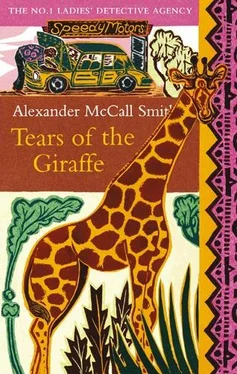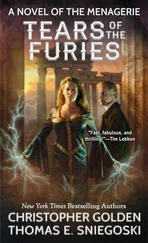Mma Ramotswe found it difficult to imagine what it would be like to have no people. There were, she knew, those who had no others in this life, who had no uncles, or aunts, or distant cousins of any degree; people who were just themselves. Many white people were like that, for some unfathomable reason; they did not seem to want to have people and were happy to be just themselves. How lonely they must be-like spacemen deep in space, floating in the darkness, but without even that silver, unfurling cord that linked the astronauts to their little metal womb of oxygen and warmth. For a moment, she indulged the metaphor, and imagined the tiny white van in space, slowly spinning against a background of stars and she, Mma Ramotswe, of the No. 1 Ladies' Space Agency, floating weightless, head over heels, tied to the tiny white van with a thin washing line.
SHE STOPPED at Francistown, and drank a cup of tea on the verandah of the hotel overlooking the railway line. A diesel train tugged at its burden of coaches, crowded with travellers from the north, and shunted oft; a goods train, laden with copper from the mines of Zambia, stood idle, while its driver stood and talked with a railways official under a tree. A dog, exhausted by the heat, lame from a withered leg, limped past. A child, curious, nose streaming, peeped round a table at Mma Ramotswe, and then scuttled off giggling when she smiled at him.
Now came the border crossing, and the slow shuffling queue outside the white block in which the uniformed officials shuffled their cheaply printed forms and stamped passports and permissions, bored and officious at the same time. The formalities over, she set out on the last leg of the journey, past granite hills that faded into soft blue horizons, through an air that seemed cooler, higher, fresher than the oppressive heat of Francistown. And then into Bulawayo, into a town of wide streets and jacaranda trees, and shady verandahs. She had a place to stay here; the house of a friend who visited her from time to time in Gaborone, and there was a comfortable room awaiting her, with cold, polished red floors and a thatch roof that made the air within as quiet and as cool as the atmosphere in a cave.
"I am always happy to see you," said her friend. "But why are you here?"
"To find somebody," said Mma Ramotswe. "Or rather, to help somebody else to find somebody."
"You're talking in riddles," laughed her friend.
"Well, let me explain," said Mma Ramotswe. "I'm here to close a chapter."
SHE FOUND her, and the hotel, without difficulty. Mma Ramotswe's friend made a few telephone calls and gave her the name and address of the hotel. It was an old building, in the colonial style, on the road to the Matopos. It was not clear who might stay there, but it seemed well kept and there was a noisy bar somewhere in the background. Above the front door, painted in small white lettering on black was a sign: Carlo, Smit, Licensee, licensed to sell alcoholic beverages. This was the end of the quest, and, as the end of a quest so often was, it was a mundane setting, quite unexceptionable; yet it was surpris-ing nonetheless that the person sought should actually exist, and be there.
"I AM Carla."
Mma Ramotswe looked at the woman, sitting behind her desk, an untidy pile of papers in front of her. On the wall behind her, pinned above a filing cabinet, was a year-chart with blocks of days marked up in bright colours; a gift from its printers, in heavy Bodoni type: Printed by the Matabeleland Printing Company (Private) Limited: You think, we ink! It occurred to her that she might issue a calendar to her own clients: Suspicious? Call the No. 1 Ladies' Detective Agency. You ask, we answer! No, that was too lame. You cry, we spy! No. Not all the clients felt miserable. We find things out. That was better: it had the necessary dignity.
"You are?" the woman enquired, politely, but with a touch of suspicion in her voice. She thinks that 1 have come for a job, thought Mma Ramotswe, and she is steeling herself to turn me down.
"My name is Precious Ramotswe," she said. "I'm from Gaborone. And I have not come to ask for a job."
The woman smiled. "So many people do," she said. "There is such terrible unemployment. People who have done all sorts of courses are desperate for a job. Anything. They'll do anything. I get ten, maybe twelve enquiries every week; many more at the end of the school year."
"Conditions are bad?"
The woman sighed. "Yes, and have been for some time. Many people suffer."
"I see," said Mma Ramotswe. "We are lucky down there in Botswana. We do not have these troubles."
Carla nodded, and looked thoughtful. "I know. I lived there for a couple of years. It was some time ago, but I hear it hasn't changed too much. That's why you are lucky."
'You preferred the old Africa?"
Carla looked at her quizzically. This was a political question, and she would need to be cautious.
She spoke slowly, choosing her words. "No. Not in the sense of preferring the colonial days. Of course not. Not all white people liked that, you know. I may have been a South African, but I left South Africa to get away from apartheid. That's why I went to Botswana."
Mma Ramotswe had not meant to embarrass her. Her question had not been a charged one, and she tried to set her at her ease. "I didn't mean that," she said. "I meant the old Africa, when there were fewer people without jobs. People had a place then. They belonged to their village, to their family. They had their lands. Now a lot of that has gone and they have nothing but a shack on the edge of a town. I do not like that Africa." Carla relaxed. "Yes. But we cannot stop the world, can we? Africa has these problems now. We have to try to cope with them."
There was a silence. This woman has not come to talk politics, thought Carla; or African history. Why is she here?
Mma Ramotswe looked at her hands, and at the engagement ring, with its tiny point of light. "Ten years ago," she began, "you lived out near Molepolole, at that place run by Burkhardt Fischer. You were there when an American called Michael Curtin disappeared in mysterious circumstances."
She stopped. Carla was staring at her, glassy-eyed. "I am nothing to do with the police," said Mma Ramotswe, hurriedly. "I have not come here to question you."
Carla's expression was impassive. "Then why do you want to talk about that? It happened a long time ago. He went missing. That's all there is to it."
"No," said Mma Ramotswe. "That is not all there is to it. I don't have to ask you what happened, because I know exactly what took place. You and Oswald Ranta were there, in that hut, when Michael turned up. He fell into a donga and broke his neck. You hid the body because Oswald was frightened that the police would accuse him of killing Michael. That is what happened."
Carla said nothing, but Mma Ramotswe saw that her words had shocked her. Dr Ranta had told the truth, as she had thought, and now Carla's reaction was confirming this.
"You did not kill Michael," she said. "It had nothing to do with you. But you did conceal the hotly, which meant that his mother never found out what happened to him. That was the wrong thing to do. But that's not the point. The point is that you can do something to cancel all that out. You can do that thing quite safely. There is no risk to you."
Carla's voice was distant, barely audible. "What can I do? We can't bring him back."
"You can bring an end to his mother's search," she said. "All she wants to do is to say goodbye to her son. People who have lost somebody are often like that. There may be no desire for revenge in their hearts; they just want to know. That's all."
Carla leaned back in her chair, her eyes downcast. "I don't know... Oswald would be furious if I talked about..."
Mma Ramotswe cut her short. "Oswald knows, and agrees," "Then why can't he tell her?" retorted Carla, suddenly angry, "He did it. I only lied to protect him."
Читать дальше









